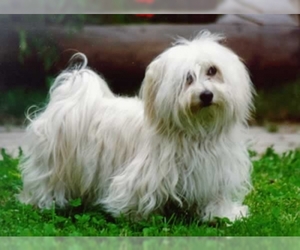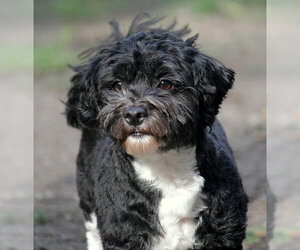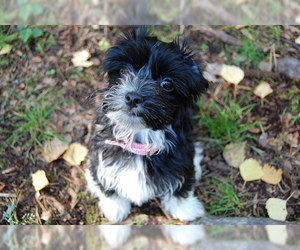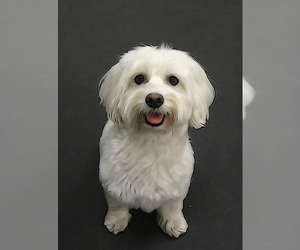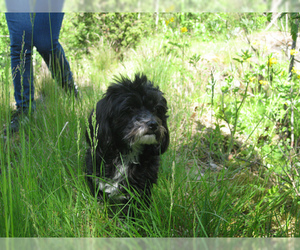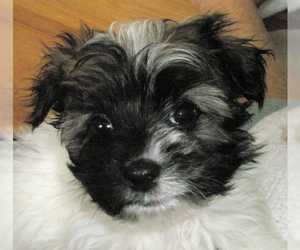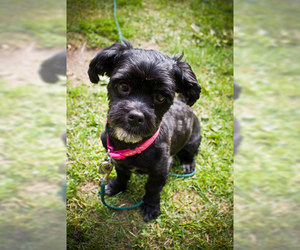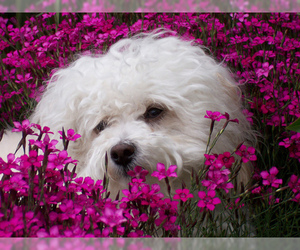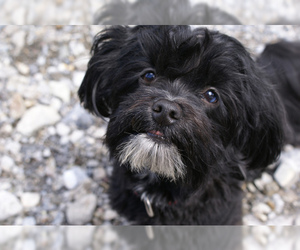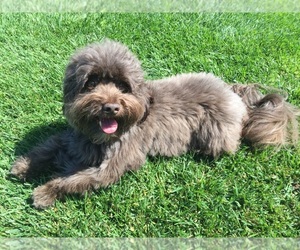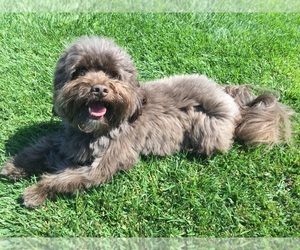
All about Havanese dog breed
A.K.A. :Havana Silk Dog, Bichon Havanese, Bichon Havanais, Havie, Cuban lapdog, Cuban Havanese, Perro de la Habana, Habenero, Havaneser, Havanese Poodle, Havanese Spaniel, Hav, Perro Bichon, Small dog from Havana, Havana Terrier
Size
Grooming requirements
Exercise requirements
Good with other dogs
Watchdog ability
Energetic
Training requirements
Playful
Affectionate
Good with other pets
Good with children
Good with strangers
Winter
Summer
Healthiness
Protective
Life Span
| Pure Breeds | Member |
| Breeds A - Z | H |
| Breeds by Group | Companion Toy |
| Breeds by Trait | Good With Kids Hypoallergenic Low Shedding Smartest Dog Breeds |
| Overview: | The Havanese, the national dog of Cuba, is a charming and intelligent toy breed known for its cheerful disposition and luxurious coat. Descending from the Bichon family, these small but sturdy dogs were brought to Cuba by Spanish colonists and developed into the affectionate companions we know today. Physically, they boast a distinctive long, silky double coat that can come in a multitude of colors and patterns, often requiring regular grooming to prevent matting. With their expressive dark eyes and plumed tail carried over their back, Havanese possess a captivating charm. Temperamentally, they are renowned for being outgoing, affectionate, and highly trainable, thriving on human companionship. This makes them excellent family pets and well-suited for apartment living, as they are adaptable and don't require extensive outdoor space. While generally healthy, potential owners should be aware of breed-specific concerns such as luxating patellas and eye conditions like cataracts, making responsible breeding and regular veterinary check-ups essential for their long-term well-being. |
F.A.Q.
All You Need to Know About the Havanese Breed
The Havanese is Cuba's charming national dog, known for its intelligence and affectionate nature. These small, sturdy companions boast a long, silky double coat that, despite its luxurious appearance, is considered hypoallergenic, making them ideal for allergy sufferers. Their playful yet gentle temperament makes them excellent family pets and wonderful companions for singles or seniors. Havanese adapt well to various living situations, including apartment living, provided they receive adequate mental stimulation and moderate daily exercise – a short walk or indoor play is usually sufficient. Grooming is essential; regular brushing prevents matting, and professional grooming every 6-8 weeks helps maintain their beautiful coat. Common health considerations include luxating patellas and eye conditions, so choosing a reputable breeder is crucial for a healthy, happy Havanese.The average weight for Havanese is typically between 7-13 pounds (3.2-5.9 kg). This is a healthy weight for Havanese adults, with little significant variation in size between males and females. Prospective owners can expect their Havanese to fall within this typical weight range, making them a small yet sturdy companion.
What is the average height of a Havanese?When considering a Havanese, understanding their typical adult size is key! The average height of a Havanese is generally between 8.5 to 11.5 inches (approximately 21.5 to 29 cm) when measured at the shoulder. This charming little breed falls into the toy dog category, making them a perfect companion for many lifestyles.While 8.5 to 11.5 inches is the standard range, you might occasionally find some slight variation. It's common for individual genetics to play a role, and there isn't a significant difference in Havanese height based on gender; both males and females typically fall within this same range. So, whether you're wondering how tall is a Havanese puppy will grow or are curious about an adult's stature, this range provides a great guideline for their average size.
The Havanese colors are incredibly diverse, making them one of the most vibrantly coated breeds. You'll find a wide spectrum of AKC recognized Havanese colors, including white, black, fawn, cream, sable, gold, silver, and various shades of red. Patterns like brindle and parti-color (two or more colors) are also common and accepted. Beyond the standard, there are also rare Havanese coat types and exotic Havanese variations that, while not typically recognized by major kennel clubs like the AKC for show purposes, are present in the breed. These can include striking shades like chocolate, blue (a dilute black), and lilac (a dilute chocolate). While beautiful, be aware that some breeders may charge a premium for these less common colors. Merle is another controversial pattern sometimes seen; however, it is not naturally occurring in the Havanese and is generally considered a result of cross-breeding. Always prioritize health and temperament over specific coat color, especially with rarer variations.
Havanese Personality & TemperamentThe Havanese is renowned for its charming and affectionate Havanese personality, making them excellent companions. They are inherently friendly Havanese, eager to please, and deeply devoted to their families, exhibiting strong loyalty. Their social nature means they thrive on human interaction and can be prone to separation anxiety if left alone for extended periods. This breed is highly adaptable, making them well-suited for apartment living as long as their moderate exercise needs are met. Havanese are generally wonderful with children, known for their gentle and playful demeanor, though supervision is always recommended with very young children. They also typically get along well with other pets, especially when properly socialized from a young age. Expect a bright, intelligent, and generally happy dog that loves to be at the center of attention.
The Havanese temperament is renowned for being friendly, outgoing, and affectionate, making them excellent companion dogs. They are highly sociable and thrive on human interaction, forming strong bonds of loyalty with their families. This breed is remarkably adaptable to apartment living, provided they receive adequate daily exercise and mental stimulation.Havanese are generally good with children, especially those who are gentle and respectful, and often playful with other household pets. While intelligent, they can exhibit a touch of stubbornness, requiring patient and consistent positive reinforcement during training. They are also quite sensitive to their owner's emotions and benefit from a calm, loving environment. This personality traits include a charming and often comical nature, making them delightful additions to many homes.
Havanese Care: Daily Maintenance & Health TipsHavanese care involves regular attention to grooming, exercise, diet, and health. This low-energy dog breed thrives with consistent daily maintenance.Grooming Needs: The Havanese boasts a long, double coat that requires daily brushing to prevent matting and tangles. Expect professional grooming every 4-8 weeks, including baths and trims. Pay special attention to wrinkle cleaning around the eyes and nose to prevent skin irritation and infection. Ear cleaning is also crucial to avoid ear infections; check and clean ears weekly.Exercise Limitations: While playful, Havanese are a low-energy dog breed and have moderate exercise needs. Short daily walks (20-30 minutes) and indoor playtime are usually sufficient. They are not suited for strenuous activities or extreme heat.Dietary Considerations: Feed a high-quality, age-appropriate dog food. Monitor portion sizes closely as Havanese are prone to weight management issues. Consult your vet for specific dietary recommendations.Health Tips for Havanese: Due to their brachycephalic (short-nosed) anatomy, Havanese can be sensitive to extreme temperatures. Avoid overexertion in hot or humid weather to prevent heatstroke. Regular dental care is essential to prevent periodontal disease; brush teeth daily. Be vigilant for common health concerns like skin issues (allergies, hot spots) and maintain a healthy weight to prevent joint problems. Regular vet check-ups are vital for early detection and prevention of health issues. Understanding how to care for a Havanese ensures a happy, healthy companion.
Havanese Activity Level: Moderately Active & AdaptableThe Havanese activity level is best described as moderately active, making them adaptable companions for a range of households. While they enjoy playful bursts of energy, they are not high-strung and are equally content to relax by your side. How active are Havanese? They thrive on a balance of mental stimulation and physical exercise.Daily exercise needs for a Havanese are relatively modest, typically satisfied with one or two short walks (15-30 minutes each) per day and some indoor playtime. They love to engage with their families in games of fetch, tug-of-war, or hide-and-seek. These intelligent dogs also benefit from puzzle toys and training sessions to keep their minds sharp.It's crucial to be mindful of their brachycephalic (short-nosed) anatomy, which limits their ability to cool down efficiently. Due to this, strenuous exercise in hot or humid weather should be avoided. Overheating is a serious concern, so always prioritize their comfort and safety. Havanese typically balance short bursts of energy with long periods of rest, often found napping cozily after playtime.Havanese are suitable for both active families who enjoy short walks and playtime, as well as low-energy households looking for a cuddly companion. Their adaptable nature means they can adjust to various lifestyles as long as their basic exercise needs and desire for companionship are met. They are known for being excellent indoor dogs and thrive on being part of family activities.
Havanese Health & Care: What to Know
When considering a Havanese, understanding their common Havanese medical issues is key to providing a happy, healthy life. While generally a robust breed, their unique anatomy can predispose them to certain Havanese health problems.One of the most significant concerns for this charming companion is Brachycephalic Obstructive Airway Syndrome (BOAS). Due to their short snout and flattened face (a characteristic of brachycephalic dogs), Havanese can experience breathing difficulties. Symptoms include snoring, snorting, coughing, and exercise intolerance. Brachycephalic dog care involves monitoring for these signs, avoiding strenuous exercise in hot weather, and ensuring they don't become overweight, as this exacerbates breathing issues.Another orthopedic concern is hip dysplasia, a genetic condition affecting the hip joints. While less common than in larger breeds, it can still occur, leading to pain and lameness. Responsible breeders screen their dogs to reduce the incidence of this condition.Due to their fluffy coats and sometimes wrinkly skin, skin fold infections can develop, particularly around the face and tail if not kept clean and dry. Regular grooming and inspection are essential to prevent these issues and manage Havanese allergies, which can manifest as skin irritation.Spinal problems, such as patellar luxation (slipping kneecaps), are also observed. This condition can cause a temporary limp and may require veterinary intervention in severe cases.Finally, their brachycephalic nature makes them highly susceptible to heat sensitivity. How to keep Havanese healthy in warmer climates involves limiting outdoor activity during peak heat, always providing fresh water, and ensuring they have access to cool, shaded areas. Never leave a Havanese unattended in a car, even for a short time.By being aware of these potential Havanese health problems and implementing good preventative care, you can help your Havanese thrive. Regular vet check-ups, a balanced diet, proper grooming, and an understanding of their needs are crucial for managing common Havanese medical issues and ensuring a long, happy life with your furry friend.Breed Breakdown: What Experts Say About the Havanese
I'd rate the "Size" trait of the Havanese breed at a 2. They are undeniably small dogs, typically weighing between 7 to 13 pounds and standing around 8.5 to 11.5 inches tall. Their delicate build and compact frame put them firmly in the toy breed category. This diminutive size makes them exceptionally well-suited for apartment living, as they don't require vast amounts of space. Their portability also makes them excellent travel companions, easily fitting into pet carriers for flights or long car rides. For households with space constraints, the Havanese is an ideal choice, as they can thrive in smaller environments without feeling confined.
I would rate the Havanese's grooming requirements as a 7 on a scale from 1 to 10.While the Havanese doesn't have the extensive "salon" needs of some other long-haired breeds, they are far from low-maintenance. Their most defining feature, their long, silky double coat, is non-shedding, which is a significant plus for allergy sufferers and those who dislike pet hair around the house. However, this beautiful coat is also highly prone to matting and tangling if not brushed regularly and thoroughly, ideally daily or at least every other day, down to the skin. This prevents uncomfortable knots and the need for painful dematting or a complete shave-down.Beyond daily brushing, Havanese require regular bathing, typically every 2-4 weeks, to keep their coat clean and free of environmental debris that can contribute to matting. Their long hair around the eyes can also lead to tear staining, which requires daily wiping and sometimes specialized products to manage. Ear cleaning is important to prevent infections, as their floppy ears can trap moisture, and nail trims are essential every few weeks to prevent discomfort and splayed feet. While generally a healthy breed, their long coat can mask skin issues if not properly maintained, and like many small breeds, they can be susceptible to allergies that manifest as skin irritation. So, while they don't have the "extreme" demands of a Poodle show cut, they definitely require frequent, consistent, and somewhat specialized grooming compared to a short-coated breed to keep them comfortable and looking their best.
I would rate the Havanese's exercise requirements at a 3.The Havanese is a relatively low-energy breed that thrives on moderate daily activity rather than intense physical demands. They enjoy regular, short walks of 20-30 minutes, playtime in the yard, and interactive indoor games. While they possess a playful spirit and enjoy bursts of activity, they are not built for sustained, high-impact exercise. Their small size and occasional tendency towards brachycephaly (though less pronounced than some other toy breeds) mean they can be susceptible to overheating and respiratory distress with overexertion, especially in warm weather. They are adaptable and happy to snuggle on the couch but also appreciate the mental stimulation of learning new tricks or participating in low-impact dog sports like rally or beginner agility. Essentially, they need consistent, gentle activity to stay healthy and mentally stimulated, but do not require rigorous, structured routines to prevent boredom or destructive behavior. They are content with a moderate amount of daily engagement and are not prone to being overly demanding of physical exertion.
I'd rate the Havanese's "Watchdog Ability" at a 6 out of 10. They are excellent at providing early warnings. Havanese are naturally very alert and will typically bark at unfamiliar sounds, people approaching the door, or anything out of the ordinary in their environment. Their barking can be quite persistent and serves as an effective alert system for the household. While they lack the size and inherent territorial aggression to physically deter an intruder, their consistent and often enthusiastic vocalizations make it clear that an unfamiliar presence has been detected. They are more than a passive companion in this regard; they are reliable "doorbell" dogs that will make sure you're aware of what's happening outside your home.
I'd rate the "Good with Other Dogs" trait of the Havanese a 9 out of 10.Havanese are generally renowned for their amicable and sociable nature, extending readily to other dogs. They typically display very little to no aggression or dominance, even around unfamiliar canines. Their playful and adaptable temperament means they can often get along well with dogs of various sizes and energy levels, though their smaller stature might require some supervision with very large, boisterous breeds to prevent accidental injury. They genuinely seem to thrive in canine company and often enjoy engaging in play or simply coexisting peacefully. While early socialization is always beneficial for any dog, Havanese usually don't require extensive, careful introductions or intensive training to coexist peacefully in multi-dog households; they often acclimate quite naturally. They are more likely to be the dog seeking a playmate or a cozy spot next to another dog than initiating conflict.
I would rate the Havanese's "Energetic" trait as a 5 out of 10. While not a couch potato, they are far from a high-energy breed. They possess a cheerful playfulness and enjoy interactive games, but their activity level is generally moderate. They appreciate regular, moderate walks and playful sessions, but don't typically require intense, prolonged exercise to be content. Compared to many companion dogs, they are more naturally active than, say, a Bulldog, but considerably less demanding than a Jack Russell Terrier. Their brachycephalic (short-nosed) anatomy plays a significant role in their stamina and exercise tolerance, especially in warmer weather. This can limit their ability to participate in strenuous or extended outdoor activities, as they are more prone to overheating and respiratory distress. Therefore, while they enjoy activity, their physical limitations prevent them from truly excelling in high-energy or athletic pursuits, keeping their overall energetic rating in the middle of the spectrum.
I would rate the Havanese's "Training Requirements" a 3.Havanese are generally quite intelligent and eager to please their owners, which makes them responsive to commands. Their relatively good attention spans and high motivation for positive reinforcement (especially treats and praise) contribute to their trainability. While they can have a touch of an independent streak or a "clownish" stubbornness when something more interesting catches their eye, it's rarely a significant roadblock. They thrive on consistency, but not necessarily a rigid, highly structured routine; a relaxed but firm approach works well. They are very beginner-friendly and don't require experienced handling, making them an excellent choice for first-time dog owners who are committed to basic, positive-reinforcement-based training.
I would rate the Havanese's "Playful" trait a solid 9. They are undeniably an extremely energetic and fun-loving breed, especially when it comes to interacting with their human companions. Havanese possess a naturally spirited disposition, constantly seeking out opportunities for engagement. They demonstrate a high typical activity level, always ready for a romp or a game of fetch, and their love for games and interaction is palpable. Their attention-seeking behavior often manifests as charming antics or a desire to be involved in whatever their family is doing. They respond to toys and playtime with an almost child-like enthusiasm, making even a simple squeaky toy an exciting adventure. This breed's overall enthusiasm in daily life is infectious, and they are definitely more naturally spirited than laid-back compared to many other companion dogs, constantly finding joy in their surroundings and sharing it with those around them.
I would rate the Havanese breed's "Affectionate" trait a 10.Havanese are renowned for their profound love and devotion to their human families. They are the quintessential companion dog, thriving on constant human interaction and physical closeness. Their desire for human companionship is immense, often manifesting as a "Velcro dog" tendency to follow their owners from room to room. They are highly attuned to owner emotions, quick to offer comfort or join in merriment. Cuddling, lap-sitting, and generally being in close proximity are not just appreciated but actively sought out. Their loyalty is unwavering, and they truly consider themselves part of the family, longing for inclusion in all activities. Compared to other companion dogs, the Havanese is exceptionally people-oriented and truly thrives on affection, often becoming sad or anxious if left alone for extended periods. They are far from independent and instead blossom in an environment rich with love and attention.
Rating: 9/10The Havanese typically rates a high 9 for "Good with Other Pets" due to their naturally sociable and adaptable nature. They generally have a low prey drive, making them less likely to view smaller pets like cats as prey. While they can be prone to mild resource guarding if not properly socialized and trained, this is usually manageable and not an inherent aggression towards other animals. Havanese thrive on companionship and often enjoy the presence of other dogs and even cats, seeing them as part of their "pack." While early socialization is beneficial for any dog, a well-adjusted Havanese is often inherently welcoming of other animals and can easily adapt to multi-pet households, often initiating play or cuddling with their animal companions. They generally require minimal training and supervision to coexist peacefully, as their desire for friendship usually outweighs any territorial or predatory instincts.
The Havanese breed rates a strong 9 out of 10 for their "Good with Children" trait.This high rating is due to their naturally affectionate, gentle, and playful temperament. Havanese are renowned for being exceptionally patient and tolerant, particularly with the sometimes boisterous energy of children. They tend to be very adaptable and less prone to stress from noise or frequent handling, often seeing it as an invitation to engage. Their size is also a contributing factor, as they are sturdy enough to handle playful interaction but not large enough to accidentally knock over smaller children. They thrive on being part of the family action and are generally eager to please, making them naturally good companions for children of various ages, from toddlers (with proper supervision, as with any pet) to older kids. While early socialization and consistent, positive reinforcement are always beneficial for any dog, the Havanese typically doesn't *require* extensive training or constant supervision solely to mitigate child-related issues; their inherent disposition leans heavily towards being a loving and compatible family member.
I would rate the Havanese's "Good with Strangers" trait as an 8 out of 10.Havanese are generally known for their affectionate and outgoing personalities, extending to unfamiliar adults. They are typically quite friendly and welcoming, often approaching new people with wagging tails and a desire for attention. While not excessively boisterous, their natural curiosity and desire to be part of the action usually make them adaptable in public or guest-filled environments. They are less prone to being highly reserved or guarding than some other breeds; their primary instinct is to be companionable. While early socialization is beneficial for any dog, a well-bred Havanese is naturally inclined to be outgoing, requiring less intensive training specifically to be comfortable with strangers compared to breeds with a more inherent wariness. Their relatively low likelihood of nuisance barking at newcomers further contributes to their pleasant demeanor with strangers.
I would rate the Havanese's "Winter" tolerance at a 2.Havanese are highly sensitive to cold due to a combination of factors. Their single coat, while long, lacks an insulating undercoat and is relatively fine, offering little protection against biting winds or low temperatures. They are small in stature and have limited body fat, making them prone to rapid heat loss. While not severely brachycephalic, their smaller size and relatively short muzzles can contribute to increased sensitivity to cold air, especially in very low temperatures. These factors significantly increase their risk of hypothermia, even in moderately cold conditions. They are not built for prolonged outdoor activity in winter climates and quickly become uncomfortable and at risk.Compared to many other companion dogs, the Havanese absolutely requires special care during winter months. They are not a breed that can simply be let out into a snowy yard for extended periods. They need warm clothing (sweaters or coats) for even short outdoor excursions, should have their paws protected from salt and ice, and their time outdoors must be strictly limited. They are best suited to indoor living and supervised, brief potty breaks in cold weather.
I would rate the Havanese's "Summer" tolerance as a 3.While not as severely brachycephalic as some breeds, the Havanese does possess a somewhat shortened muzzle, which can slightly impede their ability to efficiently pant and cool themselves compared to dogs with longer snouts. Their relatively thick double coat, while soft and beautiful, is designed for insulation and can trap heat, making it harder for them to dissipate excess body warmth. This combination means they are more susceptible to overheating and have a higher risk of heatstroke, even with moderate activity in warm weather. They struggle to regulate their body temperature effectively when temperatures rise significantly.Therefore, Havanese absolutely require special care in summer months compared to many other companion dogs. They are not dogs that can be left outside for extended periods in even mild summer temperatures, and their outdoor activity needs to be severely limited to early mornings or late evenings when it's cooler. Air-conditioned environments are crucial for them during hot weather, and owners should always be vigilant for signs of overheating.
I would rate the Havanese's "Healthiness" trait a 7 out of 10.The Havanese is generally considered a robust and healthy breed compared to many other companion dogs, which is a significant positive. They have a good average lifespan, often living into their early to mid-teens. They are not prone to the severe breathing difficulties seen in brachycephalic breeds, nor do they typically suffer from the widespread, debilitating joint problems common in some larger breeds.However, a rating of 10 would imply almost no breed-specific health concerns, which isn't entirely accurate. Havanese are genetically predisposed to certain conditions, including patellar luxation (a common small breed issue), cataracts, and occasionally progressive retinal atrophy. Less common but still present are issues like Legg-Calve-Perthes disease and liver shunts. Skin conditions can sometimes arise, often related to allergies. Responsible breeding practices, including health testing of parent dogs, play a crucial role in minimizing the incidence of these inherited diseases, but they can still occur. While not high-maintenance in terms of needing constant medical intervention, owners do need to be vigilant for these potential issues and provide good preventive care, including regular veterinary check-ups and maintaining a healthy weight. Overall, they are a generally healthy breed, but not entirely without their specific challenges.
I would rate the Havanese's "Protective" trait at a 3.While the Havanese are incredibly loyal to their owners and are known for their alertness, making them excellent little "doorbell" watchdogs, their protective instincts don't extend much beyond vocalizing. They will certainly bark at strangers approaching the home or at unusual noises, and their devotion to their family means they might place themselves near their loved ones if they perceive a threat, but they are not built for or inclined towards physical protection. They lack territorial aggression in a meaningful sense and are more likely to greet a stranger with curiosity (after an initial bark) than with a strong defensive stance. Their small size and gentle nature mean they are definitely a companion dog through and through, capable of offering boundless love and a heads-up that someone's at the door, but not meaningful protection in a household setting against an intruder or a genuine threat.
The Havanese breed rates a 9 for its "Life Span" trait.Havanese are renowned for their exceptional longevity among companion dogs, often living well into their teens. Their average life expectancy typically ranges from 12 to 15 years, with many individuals exceeding this and living to 16, 17, or even older. This places them firmly in the "long-lived" category compared to most other breeds. While they are prone to some health issues, such as patellar luxation, eye disorders (like cataracts and progressive retinal atrophy), and occasional deafness, these conditions are often manageable and generally do not significantly shorten their lifespan if properly diagnosed and treated. Responsible breeding practices, including health testing of parents, help to minimize the incidence of inherited diseases. Coupled with proper nutrition, regular exercise, and good veterinary care, the Havanese typically enjoys a very long and healthy life.
Havanese Puppies for saleSee all puppies for sale
Havanese Dogs for adoptionSee all dogs for adoption
Havanese BreedersSee all breeders
Similar Dog Breeds for Havanese
Breed Mixes of Havanese
Quick Breed Selector 0 - not important, 1 - smallest, 10 - largest
Variants & Mistakes :Havanes, Havanaese, Havaneese, Havaniece, Havanise, Havanies, Havanese dog, Havanees, Havanise dog, Havaneeese, Havaanese, Havanesse, Havannese, Havanisie, Havaniesie, Havaniseee, Havaniss, Havaness, Havanas, Havanans, Havanesees, Havaneseie, Havanaise, Havannais, Havanee, Havanessa
